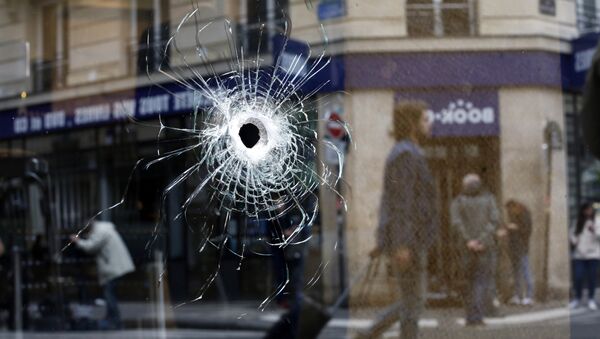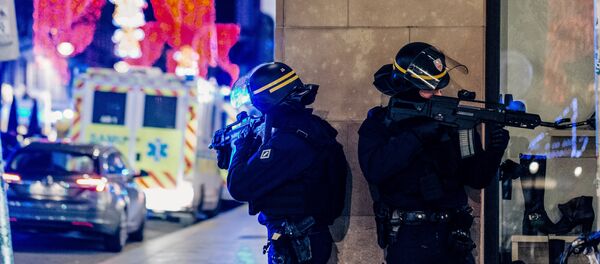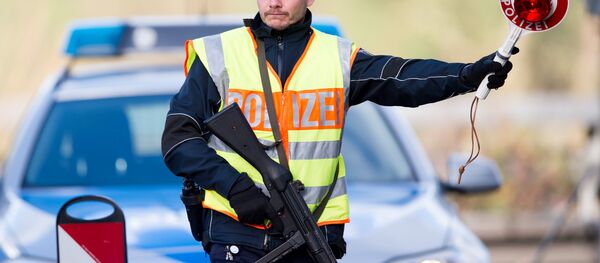Following the incident, the French interior minister said that France would raise the security threat level and strengthen border control, as well as counter-terrorism measures.
Sputnik discussed this with Philip Ingram, a former senior British intelligence and security officer.
Philip Ingram: It's very difficult indeed. The police will have their monitoring lists. In the UK, there're 700 active investigations against 3,000 people. Those 3,000 people are on the watch list. There're another 20,000 people of interest in the UK; France has even bigger numbers. The resources that are needed to monitor these people are only finite; there's not enough to monitor all of them.
What happens is they will be risk assessed; and you need a very joined up intelligence and security machinery to be able to risk assess people properly. France, unfortunately, doesn't have as joined up intelligence and security machinery as the UK and the US have.
READ MORE: First Picture of Strasbourg Shooting Suspect Circulated in Local Media
Sputnik: How does a person flagged by intelligence agencies and listed as a potential security threat obtain a weapon? What laws are there between member states that regulate weapon possessions?
Sputnik: Some experts have noted that the problem for security services in many of these European countries appears to be the gap between surveillance of members and criminal terrorist extremist nexus and prosecuting perpetrators for crimes, such as acquiring the guns and illegal firearms. How accurate is that opinion?
Philip Ingram: It is accurate; there is a real problem. The end of 2015 attacks in Paris, there was a parliamentary commission in the French parliament that highlighted a global failure in French intelligence. And part of the problem is that there're so many different agencies; there're 9 different intelligence agencies, there're 2 national police forces — one working for the Ministry of Interior and the other one working for the Ministry of Defence; then you've got the local police forces. Passing information between all of them really doesn't happen in a joined up way; there're huge rivalries. We have actually seen the gendarmerie and the police national fighting against each other in the streets in Paris a couple of years ago.
READ MORE: Strasbourg Gunman Shouted 'Allahu Akbar', Was Injured During Attack — Prosecutor
So, you don't get that level of cooperation; and without that level of cooperation, it's very difficult to keep a handle on individual extremists that are around in different areas, especially if they are just on the radar. There's nothing to suggest that they're going to get imminently involved in an attack. And this individual was to be arrested that morning for criminal activity, but he wasn't in his apartment as I understand.
Sputnik: What can you tell us in terms of the strategy moving forward in these EU countries? Obviously, the weakness is the freedom of movement between Schengen states and the EU countries where the borders are open. With the history of those terrorist attacks both in the UK and mainland Europe, there have been certain patterns of activity in terms of these migrants and Muslim terrorists perpetrating these acts. Has anything moved forward? Has there been any advancement in terms of intelligence or ways of prohibiting certain activities since these activities, especially that of 12-18 months ago, both in Europe and the UK, where there was a cluster of these events? Is there any movement forward?
Philip Ingram: We have to remember that this individual wasn't someone to come up with the refugees; he was Strasbourg-born, he had been in prison in Germany and extradited from Germany back to France. He was given a fiche S, which is a flag saying that he is eligible for surveillance because people were worried about the radicalization that he'd gone through whilst he was in prison in Germany.
And if you don't have a joined up intelligence and security organization in your own country, it's very difficult then to join that in properly to what is going on internationally. France doesn't have a joined up intelligence and security apparatus in the same way that the UK does through its joined terrorist analysis centre where all of the different agencies sit down together in one place and talk threats on a daily basis.
The views and opinions expressed by the speaker do not necessarily reflect those of Sputnik.






